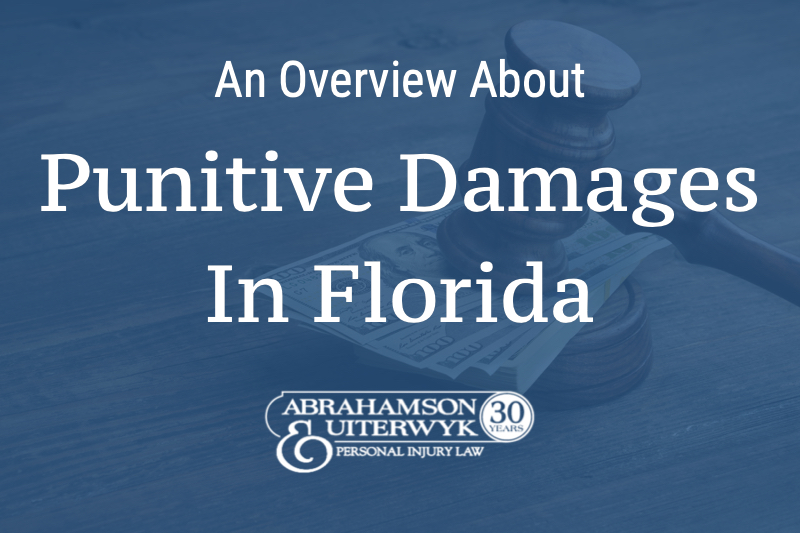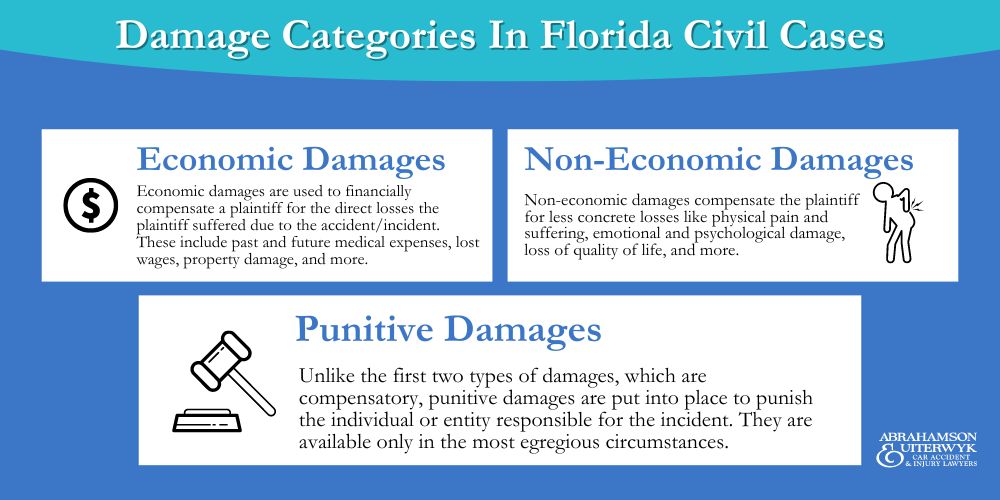TL;DR
- Punitive damages in Florida punish defendants for intentional misconduct or gross negligence.
- Only available when strong evidence supports the claim, per Florida Statute 768.72.
- Unlike compensatory damages, they aim to deter future misconduct and hold wrongdoers accountable.
- Florida caps punitive damages at 3× compensatory damages or $500,000, with higher limits in certain cases.
- Personal injury attorneys help gather evidence, expert testimony, and legal arguments to pursue punitive damages successfully.
As the name suggests, punitive damages are meant to punish a defendant or to act as a deterrent.
But not every plaintiff in a civil case (such as a personal injury claim) can ask for punitive damages. The requirements for eligibility are fairly strict.
Wondering what is the Florida punitive damages statute? Florida Statute 768.72 allows punitive damages only when “there is a reasonable showing by evidence in the record or proffered by the claimant which would provide a reasonable basis for recovery of such damages.”
Understanding when a court can award punitive damages is important for anyone who may be involved in a lawsuit. In this guide, here’s how punitive damages in Florida work and who may be eligible for them.
While compensatory damages are awarded in personal injury cases to compensate the victim for their economic and non-economic losses, punitive damages in Florida serve a dual purpose by both punishing the at fault party for grossly negligent, reckless or intentional actions, and by serving as a warning to deter others from committing the same actions in the future. By imposing punitive damages in personal injury cases, the Florida legal system sends a resounding message that egregious actions will not be tolerated, creating a sense of accountability and responsibility among individuals and communities.

Florida Punitive Damages Definition
Punitive damages are available in Florida civil actions that meet the stringent criteria as outlined in the state statute 768.72. Punitive damages cannot be claimed as personal injury damages unless there is a reasonable basis supported by evidence in the record or provided by the victim. The victim, often referred to as the claimant, may request to amend their complaint to include punitive damages by following the rules of civil procedure. The rules of civil procedure are interpreted liberally to allow for the discovery of evidence relevant to punitive damages.
However, discovery of the defendant’s financial worth is not permitted until after the pleading concerning punitive damages is allowed. This means that in legal proceedings in Florida, the process of uncovering or disclosing the defendant’s financial assets or net worth cannot be completed until after the court has permitted the inclusion of punitive damages in the personal injury case. In other words, the victim or their Florida personal injury attorney cannot investigate or request information about the defendant’s financial situation until a Florida court has granted permission to pursue punitive damages. Moreover, for a defendant to be held liable for punitive damages, the factual evidence must present, based on clear and convincing evidence, that the defendant personally engaged in either:
- Intentional Misconduct – Intentional misconduct under Florida law refers to actions where the defendant knowingly pursued actions with actual knowledge of its wrongfulness and the high probability that their actions would result in injury or damage.
- Gross Negligence – On the other hand, gross negligence is legally defined as conduct so reckless or lacking in care that it demonstrates the defendant had a conscious disregard or indifference to the life, safety, or rights of others. It is important to remember there are 4 elements of negligence in Florida.
What Are Damages In Florida?
In personal injury cases, damages refer to the money awarded to victims who have suffered harm due to someone else’s actions or negligence. However, there are two main types of damages that can be awarded: compensatory damages and punitive damages.
- Compensatory Damages – Compensatory damages are monies awarded for the purpose of reimbursing the injured party for the losses they have experienced as a direct result of negligence of the defendant. These damages typically include economic damages, such as medical expenses and lost wages, which can be assigned a monetary value. Compensatory damages may also encompass non-economic damages, which are more subjective and relate to the intangible losses a victim may experience like pain and suffering, emotional distress, and loss of enjoyment of life. Together, economic and non-economic damages strive to fairly compensate the victim for all the harm they have suffered due to the injury caused by another.
- Punitive Damages – Unlike compensatory damages, the primary objective of punitive damages is to penalize severe or egregious misconduct committed by the defendant. These damages serve multiple purposes, including:
- Punishment – Punitive damages act as a form of punishment against defendants for engaging in reprehensible behavior toward the victim. While imprisonment is not an option in civil cases, punitive damages can provide a means to hold the defendant accountable for their actions, on top of compensatory damages.
- Specific Deterrence – Punitive damages aim to deter the defendant from repeating the misconduct in the future, by punishing them financially. By imposing financial consequences, the court hopes to incentivize the defendant to refrain from similar behavior to avoid further penalties.
- General Deterrence – Punitive damages function as not to just deter the defendant from committing similar acts in the future, but as a deterrent to discourage other individuals and entities from engaging in similar misconduct. Publicizing the consequences of such behavior through punitive damages will send a clear message to the community about the unacceptability of such actions, and aims to make an example out of the defendant.
Damage Categories in Florida Civil Cases
When someone suffers injuries or other losses due to the negligent or wrongful act of another, they are entitled to seek compensation. In Florida, there are three basic categories that a plaintiff may receive in a lawsuit or settlement.
Economic Damages
Economic damages are used to financially compensate a plaintiff for the direct losses the plaintiff suffered due to the accident/incident. These include past and future medical expenses, lost wages, property damage, and more.
Non-Economic Damages
Non-economic damages compensate the plaintiff for less concrete losses like physical pain and suffering, emotional and psychological damage, loss of quality of life, and more.
Punitive Damages
Unlike the first two types of damages, which are compensatory, punitive damages are put into place to punish the individual or entity responsible for the incident. They are available only in the most egregious circumstances.

Florida Punitive Damages Statute
As mentioned above, Florida Statute 768.72 dictates when punitive damages are available in a lawsuit: “A defendant may be held liable for punitive damages only if the trier of fact, based on clear and convincing evidence, finds that the defendant was personally guilty of intentional misconduct or gross negligence.”
The language of the law indicates that this is a pretty high bar to clear. Only a trier of fact (the jury) is allowed to award punitive damages and only under exceptional circumstances.
The onus is on the plaintiff not just to ask for these damages but also to prove them. The “clear and convincing” standard is higher than the normal personal injury-proof standard, which means that the plaintiff needs strong evidence to back their damages claim.
The fact of the matter is that punitive damages aren’t awarded very often. Generally, punitive damages claims are not meant for a plaintiff to recover extra damages for themselves. Instead, they are intended to punish a defendant for a particularly heinous act or to provide a warning to future defendants to avoid similar conduct.
Intentional Misconduct v. Gross Negligence
What is the Florida negligence law? Under the Florida punitive damages statute, there are two situations where punitive damages are appropriate. These are when the defendant’s actions are grossly negligent or the defendant commits intentional misconduct. Both are expressly defined by Florida law:
- Gross negligence exists when the defendant’s conduct was so reckless or wanting in care that it constituted a conscious disregard or indifference to the life, safety, or rights of persons exposed to such conduct (Florida Statutes 768.72 (2)(b)); and
- Intentional misconduct exists when the defendant had actual knowledge of the wrongfulness of the conduct and the high probability that injury or damage to the claimant would result and, despite that knowledge, intentionally pursued that course of conduct, resulting in injury or damage (Florida Statutes 768.72 (2)(a)).
Only if the defendant or possible at-fault party committed acts that fit either of these will the court consider awarding punitive damages in addition to the other categories.
Treble Damages in Florida
Treble damages in Florida refer to a legal concept where a court awards three times the amount of actual damages to the plaintiff in certain cases. This type of compensation aims to deter wrongful conduct and provide a more substantial financial penalty for the defendant. Treble damages can be applicable in cases involving fraud, antitrust violations, and other intentional wrongdoing. It’s important to note that treble damages are distinct from punitive damages, as they focus on compensating the plaintiff for their losses rather than solely punishing the defendant.
How Are Punitive Damages Calculated In Florida?
Here’s how punitive damages are calcuated in Florida. Punitive damages in Florida are subject to specific guidelines for calculating what may be awarded. Generally, Florida law caps punitive damages at three times the amount of compensatory damages awarded or $500,000, whichever is greater. However, if the defendant’s actions were driven solely by unreasonable financial gain, and the potential harm was undoubtedly known by those responsible for the harm to the victim, this cap may be increased to the greater of four times the compensatory damages or $2 million. Finally, there is no limit to punitive damages in cases of intentional contact undertaken with the special intent to harm the victim.
The Process of Asking for Punitive Damages
There is a specific way that a personal injury attorney must seek punitive damages in Florida in a trial setting. First, there is a hearing before the judge. This determines if there is sufficient evidence to allow the plaintiff to present a claim for punitive damages to the jury.
If the judge approves, the plaintiff must then present enough clear and convincing evidence to the jury that punitive damages are appropriate in your case.
An attorney may not just randomly ask for punitive damages at the end of a trial, nor can a jury tack these onto a damages award once it has reached a verdict. If the process is not followed, a jury cannot award any punitive damages.
Florida Punitive Damages Cap
Under the Florida punitive damages statute, it’s possible to receive an award that equals the greater of three times the compensatory damages or the amount of $500,000.00. Most states place limits on the amount that a plaintiff can receive in compensation for a personal injury claim. Most states do not place limits on economic damages, as long as the losses are supported with evidence. Some states limit non-economic damages, but Florida does not.
The only category that Florida limits (or caps) is punitive damages. A plaintiff can only receive up to three times the amount they receive for compensatory damages (economic and non-economic damages combined). Anything above is capped by law.
How A Florida Personal Injury Attorney Can Help With Collecting Punitive Damages
At Abrahamson & Uiterwyk, our team of nearby Florida personal injury attorneys is dedicated to assisting victims in seeking punitive damages alongside their personal injury damages. Our attorneys play a crucial role in helping clients build a compelling case by employing various strategies, including:
- Investigation and Discovery – We conduct thorough investigations and work tirelessly to uncover evidence that directly proves intentional misconduct or gross negligence. This may involve, but is not limited to:
- Gathering witness statements
- Obtaining surveillance footage
- Exploring any available documentation of past negligence related to our client’s case
- Expert Witnesses – Our personal injury lawyers will seek the testimony of expert witnesses, such as medical professionals or accident reconstruction specialists, in an effort to provide supporting arguments for punitive damages. These experts will help establish the severity of the injury as well as help determine if the act was intentional or involved gross negligence.
- Documentary Evidence – We compile and present relevant documents, such as internal memos, emails, or records. We do this in an effort to reveal a defendant’s knowledge of potential and the deliberate nature of their actions. Such evidence can strengthen the case for punitive damages for our personal injury clients.
- Defendant’s History – If the defendant has a history of similar misconduct, we will bring this evidence to light to provide proof of a pattern of negligent behavior. By doing so this will highlight the defendant’s awareness and disregard for potential harm they knew could be caused by their actions.
- Financial Motive – In our investigations, we look for evidence that uncovers a desire for financial gain, and then seek to prove that it drove the defendant to conduct intentional actions that potentially justify higher punitive damages.
- Depositions – Our personal injury attorneys will conduct investigative depositions of relevant parties, including the defendant and witnesses. In these depositions, we will collect sworn testimonies that can be used as evidence in court to establish the intentional nature or gross negligence of the defendant’s actions, which in turn will prove the need for punitive damages.
- Legal Research and Argumentation – We conduct in-depth legal research to identify and apply precedent or legal principles that support our client’s claim for punitive damages. The persuasive legal arguments crafted by our Florida personal injury attorneys will be presented and defended in court.
Contact Us for Guidance on Punitive Damages in Florida
If you are seriously injured due to someone else’s negligent or wrongful actions, it’s normal to feel overwhelmed. You may be unable to work and struggle both physically and emotionally to recover from your losses. At Abrahamson & Uiterwyk, we are here to help. If you have questions or need assistance understanding the Florida punitive damages statute, feel free to contact our team for guidance.
Based in Tampa, our personal injury attorneys also handle cases in St. Petersburg, Clearwater, and throughout the state of Florida. For over 35 Years we have fought for the well-being of our clients and are proud of our case results. We have received an A+ rating from the BBB, an “AV” rating from Martindale-Hubbell, and a “Best Law Firm” rating from US News & World Report.
When it comes to serious injuries, the nearby team at Abrahamson & Uiterwyk provides excellent advocacy as well as personal service. Our experienced Florida personal injury lawyers help clients build strong cases and present compelling evidence to justify the awarding of punitive damages in instances of intentional harm or gross negligence. For a free consultation, call us at 813-223-5295 or contact us on our website to schedule an appointment.


How do Florida statutes define compensatory damages in cases of medical malpractice and personal injury?
In Florida, compensatory damages in cases of medical malpractice and personal injury are defined as monetary awards intended to compensate the injured party for actual losses and harm suffered. These type of damages are intended to restore the individual to the position they were in before the injury occurred, to the extent possible. Compensatory damages may include both economic damages, such as medical expenses, lost wages, and property damage, as well as noneconomic damages, such as pain and suffering, emotional distress, and loss of enjoyment of life.
How can an injury attorney assist in maximizing compensation for non-economic damages in a personal injury case?
An injury attorney plays a vital role in seeking to maximize compensation for non-economic damages in personal injury cases by employing various strategies. They collect and present compelling evidence, including medical records and expert testimony, to demonstrate the extent of non-economic harm suffered by the victim. Utilizing their legal expertise and negotiation skills, attorneys advocate for fair compensation, leveraging their understanding of case law and precedents. They work with experts to accurately assess damages, considering factors such as injury severity and long-term impact on the victim’s quality of life. In cases where a fair settlement cannot be reached, attorneys provide strong trial representation, presenting persuasive arguments to secure maximum compensation. Additionally, they offer emotional support and guidance to clients throughout the legal process, helping them navigate challenges and stay focused on obtaining the compensation they deserve.